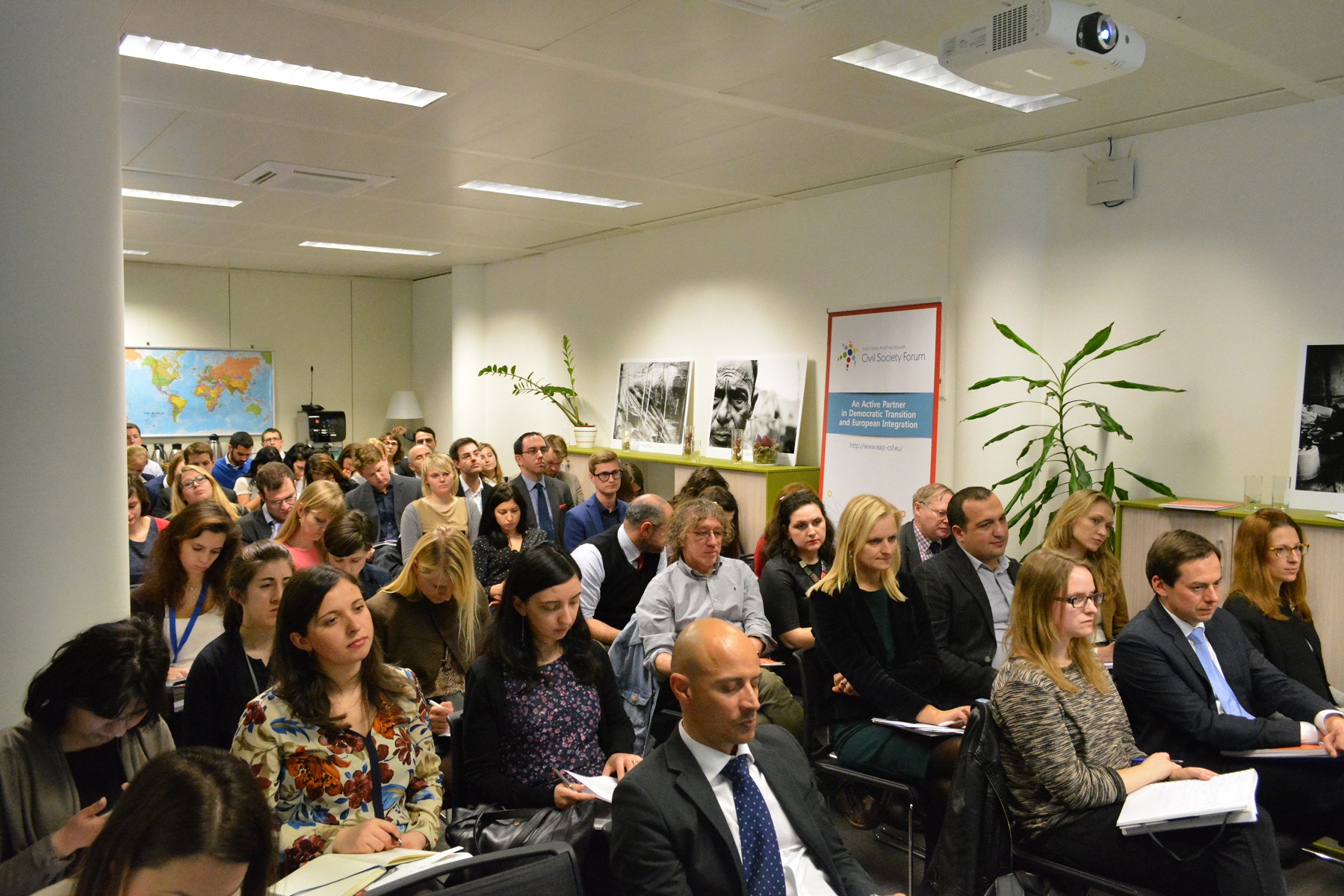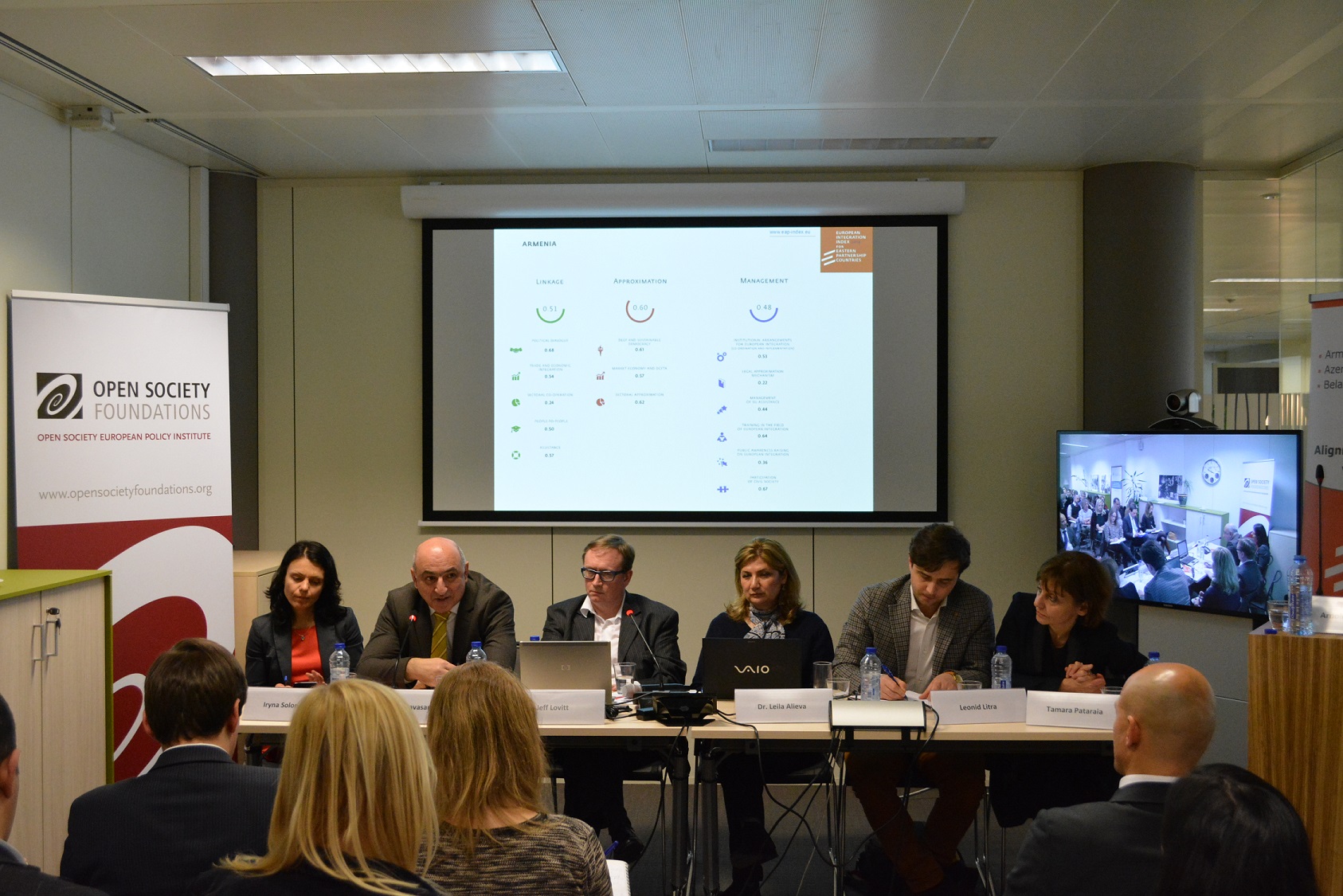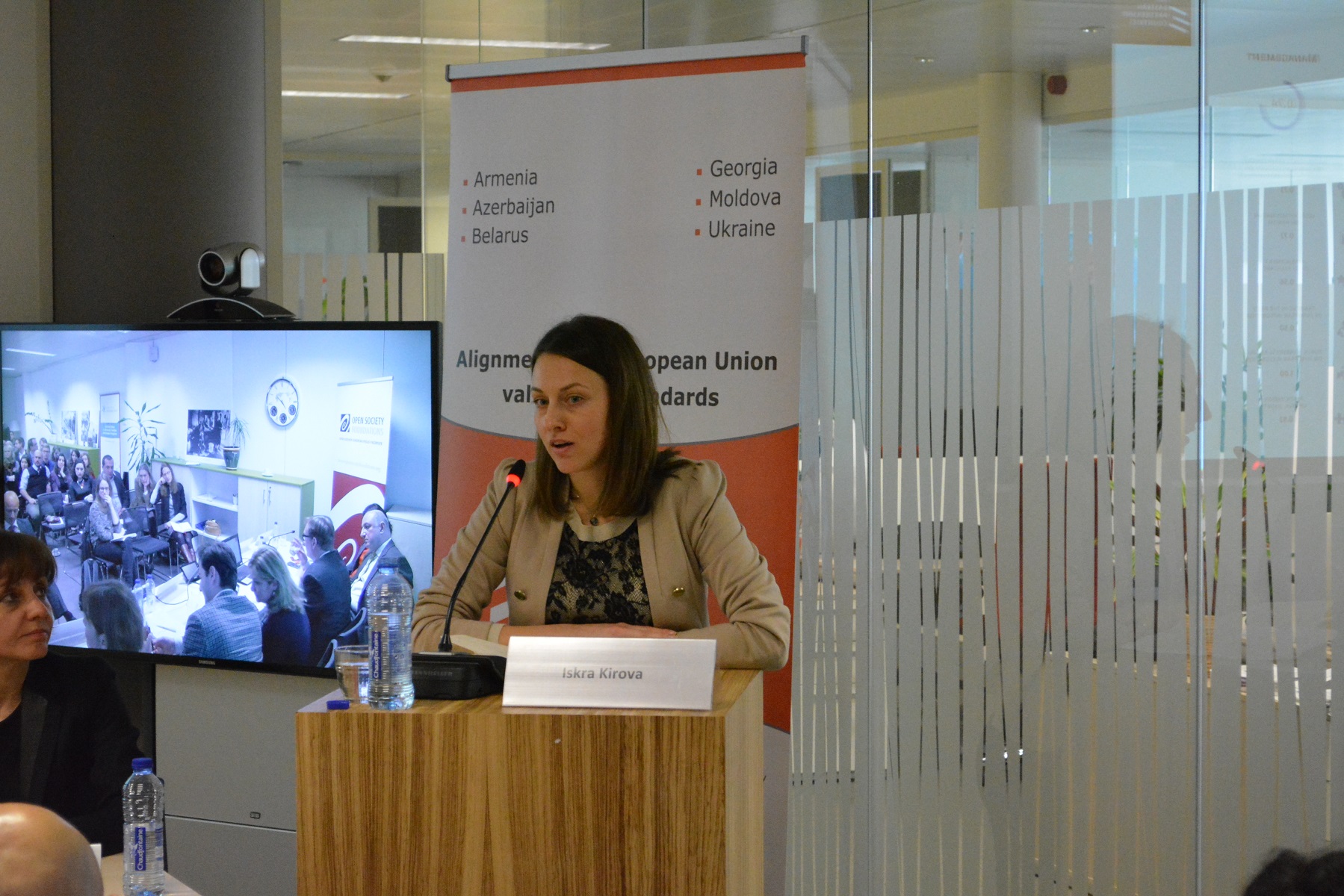|
IN THE SPOTLIGHT |
Eastern Partnership Civil Society Forum
|
|
Highlights of the panel event “The Eastern Partnership in 2014: turning point for some, insecurity for all” in BrusselsOn 25th of March 2015, an EaP CSF panel event The Eastern Partnership in 2014: turning point for some, insecurity for all took place in the premises of the Open Society Foundation in Brussels. The focal point of the event was the presentation of the new edition of The European Integration Index for Eastern Partnership Countries 2014 (EaP Index 2014). The 2014 Index generates recommendations to guide countries along the reform process and serves as a monitoring tool for both civil society and policymakers in the partner countries and the EU. The highly attended event kicked off with the welcoming speech by Natalia Yerashevich, the Director of the Secretariat of the Eastern Partnership Civil Society Forum. In his introduction Arnoldas Pranckevicius, the Adviser to the President of the European Parliament, stressed the importance of Eastern Partnership policy to the EU mentioning that its failure will be appreciated by the forces that want to undermine the EU and NATO. He urged the audience “to get serious about the strategic thinking”, referring to the weakness of EU’s strategic patience and a short span of attention of the media and policy-makers. Mr. Pranckevicius suggested that EU must become less procedural, less predictable, more visionary and match its core interests with core values. “EU is finally waking up to the fact that in order to protect the paradise of democracy and rules, it needs concentration, leadership and political wisdom” said Schulz’s adviser for foreign affairs. Jeff Lovitt, Director of Policy Association of Open Society (PASOS) and editor-in-chief of the publication, shared the key results of this year’s Index publication:Moldova remains the top reformer in region, even though Georgia, the second best performer, overall showed the biggest advances in the 2014 Index. He also mentioned that the countries need to work themselves on strengthening their institutions and to secure themselves. He also shared his concerns on the Eastern Partnership being the right tool to address the security and media issues. According to Mr. Lovitt, Twinning programmes with EU and NATO members can be the solutions when it comes to the former, while foreign media coverage of the Ukrainian crisis can address the latter. After the brief introduction, experts from Armenia, Azerbaijan, Moldova, Georgia and Ukraine took the floor to discuss the performance of the relevant countries. Armenia Boris Navasardyan, the President of the Yerevan Press Club from Armenia commented on the challenges related to the media freedom and oligarchic system. He said there is a presence of ambiguity in Armenia in terms of its further relations with the EU. Even though there are examples of the government acceptance of the positions of the civil society, negative trends can be found in the media sphere and political processes that led to the destruction of the major opposition party. He also addressed the problem of the current ‘legislative standstill’, which is mainly due to the opposition that blocks all the draft laws. Azerbaijan Dr. Leila Alieva, academic visitor to University of Oxford and the President of the Center for National and International Studies in Baku, stressed the peculiarities of the relations between the EU and Azerbaijan. EU has clear strategic interests concerning energy from Azerbaijan that remains the core of these relations. At the same time civil society organisations are struggling to operate. Even though there are numerous human rights violations to which the EU is closing its eyes. Human rights standards can be guaranteed through conditionality on energy deals with the EU. Georgia Tamar Pataria, the Georgian expert from Caucasus Institute for Peace, Democracy and Development, while presenting the recent developments in Georgia and its best Approximation score in Index, stressed that in the view of a successive political dialogue and positive reforms, the economic growth is important for the country and it still remains as a target in EU and Georgia relations. However, Ms Pataria also commented that previously being favourable, business climate recently got worse in Georgia. This has to do with the strong need for security to be ensured. The moderator of the discussion, Jeff Lovitt also added that Georgia scored best when it comes to the communication on European integration as it developed the communication strategy in this regard. Moldova In the 2014 Index, Moldova appears to be the front-runner, however as agreed by the experts it is partly because Index research period covered only until July 2014. The last developments; especially in the area of elections, are therefore not taken into account in this year’s publication and will be present in next years evaluation. As Leonid Litra, the associated expert of Institute for Development and Social Initiatives (IDIS) “Viitorul” shared with the audience that one of the problems Moldova is facing in its European integration path is the oligarchy in the country. Unlike in other EaP countries, the oligarchs in Moldova are usually pro-EU as they see economic opportunities in having stronger ties with the EU. However, they block any reform process as soon as their personal interests are threatened. The three biggest challenges for Moldova are the judiciary reform, fight against corruption, and the unfavourabla -business climate. Leonid Litra made a strong call for the EU not to be indulgent regarding Moldova and other EaP countries’ progress towards European integration. “Reforms should be undertook and well implemented and the EU should be very critical in its assessments” said the expert. Even though Moldova is a leader in EaP Index, he sees less progress in the EU and Moldova relations lately– new government (as it embraces communists) is less devoted to the European integration. Ukraine Iryna Solonenko, the initial creator and one of the experts in this year’s EAP Index, revealed that despite the current challenges that Ukraine had to face last year, optimistic trends are visible in Ukraine. The civil society is presently very active in the country. 77% of the population is participating in the funding of civil society activities. Furthermore, many volunteer movements have emerged, in particular toassist to IDPs. “Pressure form the EU is actually very useful” thinks Ms Solonenko. The country needs pressure to be encouraged to adopt and implement reforms, and there should be even more pressure coming from the EU for reforms: “We need and we want pressure”. One of the challenges Ukraine is facing is the remaining legacy of Yanukovych. Many of his people are still in place in public institutions, which impedes reform processes. It is a problem of particular importance to the judiciary system. There is no institution that has the competence to replace judges who took office under Yanukovych. As a consequence the judiciary system is not independent and its reform is hampered. In the closing remarks Iskra Kirova, the policy analyst of Open Society European Policy Institute, hosting the event, paid attention that EaP countries are facing both external and internal challenges that certainly need the correct attention from the EU.
The full text of the EaP Index publication can be found here. The supporting methodologic/research data for EaP Index can be found here. |
Project funded by the European Union
![]()










